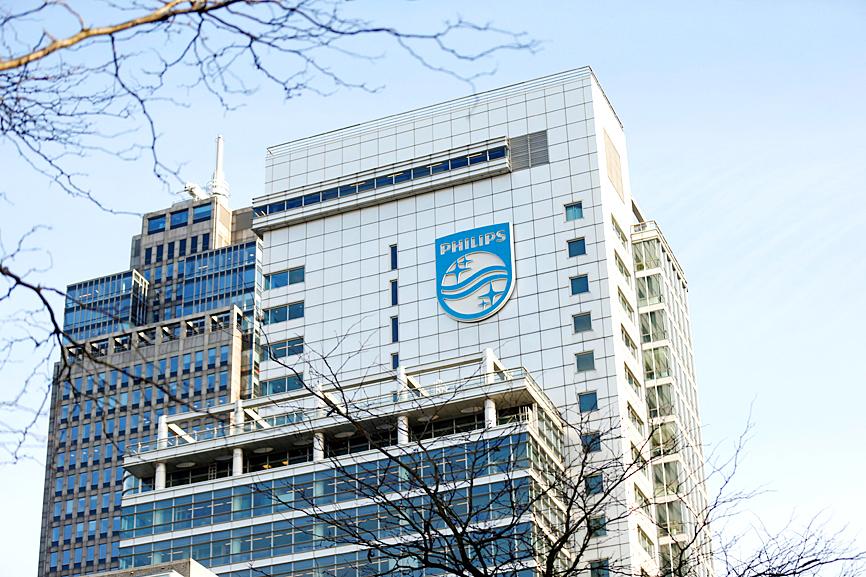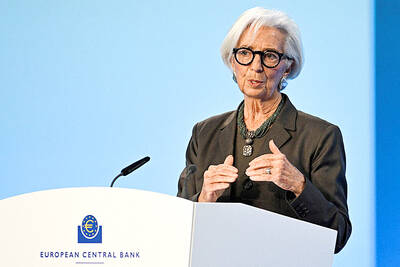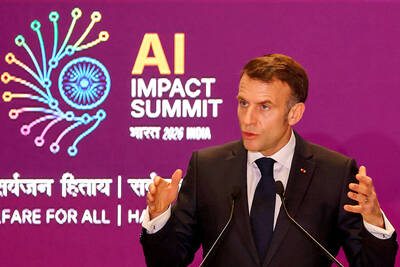Royal Philips NV’s quarterly operating profit missed analyst estimates as the Dutch maker of respiratory gear and body scanners warned of rising supply-chain challenges, inflation and the effects of Russia’s invasion of Ukraine.
Philips yesterday said its first-quarter adjusted earnings before interest, taxes and amortization fell to 243 million euros (US$261.2 million), from 362 million euros a year earlier. The figure fell short of an estimate of 274 million euros in a Bloomberg survey of analysts.
“We are implementing additional cost measures, as well as price increases, to mitigate the inflationary headwinds,” chief executive officer Frans van Houten said in a statement.

Photo: Reuters
The supply-chain issues and rising costs are adding to the company’s product woes.
Philips last week said that it is investigating whether there is a link between a patient’s death and a potential malfunctioning of two of the company’s ventilators.
The company also has had to recall some of its sleep apnea devices after it was found that some of them use sound-abatement foam that can degrade and be ingested or inhaled, potentially resulting in toxic or carcinogenic effects.
The company said provisions for the recall rose by 165 million euros in the quarter and the total expected units to be remediated have increased by approximately 300,000, primarily in the US.
The company is replacing or repairing the devices “as fast as possible,” the CEO said.
Philips recorded revenue of 3.9 billion euros in the three months through last month, slightly better than expected.
While the company said it is seeing robust order growth, it warned that the supply issues, COVID-19 in China and the war in Ukraine “may potentially impact our ability to convert our strong order book to sales.”

European Central Bank (ECB) President Christine Lagarde is expected to step down from her role before her eight-year term ends in October next year, the Financial Times reported. Lagarde wants to leave before the French presidential election in April next year, which would allow French President Emmanuel Macron and German Chancellor Friedrich Merz to find her replacement together, the report said, citing an unidentified person familiar with her thoughts on the matter. It is not clear yet when she might exit, the report said. “President Lagarde is totally focused on her mission and has not taken any decision regarding the end of

French President Emmanuel Macron told a global artificial intelligence (AI) summit in India yesterday he was determined to ensure safe oversight of the fast-evolving technology. The EU has led the way for global regulation with its Artificial Intelligence Act, which was adopted in 2024 and is coming into force in phases. “We are determined to continue to shape the rules of the game... with our allies such as India,” Macron said in New Delhi. “Europe is not blindly focused on regulation — Europe is a space for innovation and investment, but it is a safe space.” The AI Impact Summit is the fourth

CONFUSION: Taiwan, Japan and other big exporters are cautiously monitoring the situation, while analysts said more Trump responses ate likely after his loss in court US trading partners in Asia started weighing fresh uncertainties yesterday after President Donald Trump vowed to impose a new tariff on imports, hours after the Supreme Court struck down many of the sweeping levies he used to launch a global trade war. The court’s ruling invalidated a number of tariffs that the Trump administration had imposed on Asian export powerhouses from China and South Korea to Japan and Taiwan, the world’s largest chip maker and a key player in tech supply chains. Within hours, Trump said he would impose a new 10 percent duty on US imports from all countries starting on

STRATEGIC ALLIANCE: The initiative is aimed at protecting semiconductor supply chain resilience to reduce dependence on China-dominated manufacturing hubs India yesterday joined a US-led initiative to strengthen technology cooperation among strategic allies in a move that underscores the nations’ warming ties after a brief strain over New Delhi’s unabated purchase of discounted Russian oil. The decision aligns India closely with Washington’s efforts to build secure supply chains for semiconductors, advanced manufacturing and critical technologies at a time when geopolitical competition with China is intensifying. It also signals a reset in relations following friction over energy trade and tariffs. Nations that have joined the Pax Silica framework include Japan, South Korea, the UK and Israel. “Pax Silica will be a group of nations